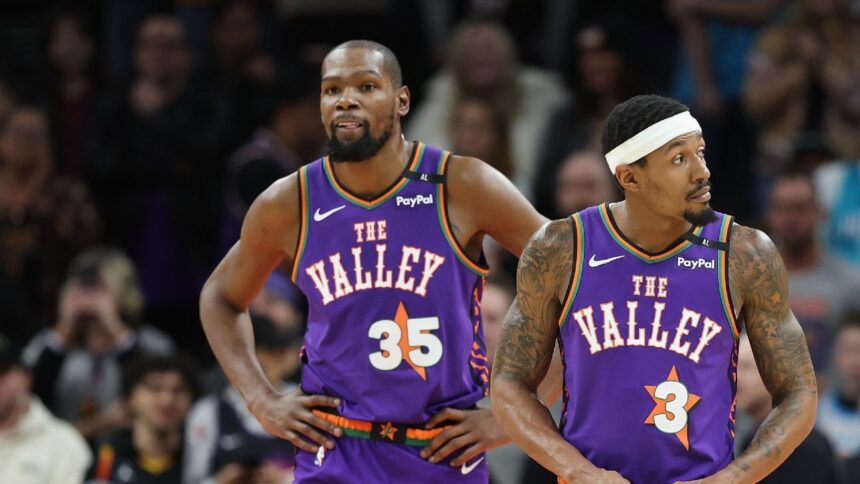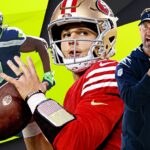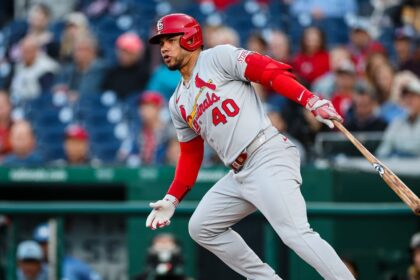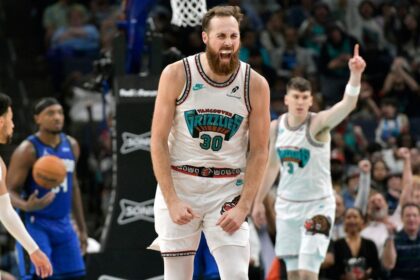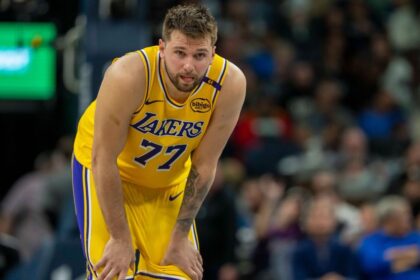The NBA, known for its constant movements, requires teams to make the right decisions in trades, signings, and draft selections to compete for the championship, and the interest of the fans often surpasses that of the games themselves.
Some of these transactions result in meteoric successes. The latest NBA champions, such as the Oklahoma City Thunder and the Boston Celtics, are clear examples of this. Both teams obtained key players like Shai Gilgeous-Alexander, Alex Caruso, Derrick White, Jrue Holiday, Al Horford, Kristaps Porzingis and draft picks that became Jalen Williams, Jayson Tatum and Jaylen Brown.
Other teams, like those that selected Nikola Jokic and Giannis Antetokounmpo with the 41st and 15th picks respectively, have also achieved success. However, not all transactions are successful, and it is precisely on those failed deals where we will focus. Following the trend of other analyses carried out by other media outlets, we will highlight the worst decisions of each NBA team so far in the 2020s, ranking them from least to most detrimental.The process here is the same. Let’s take a look at the most detrimental moves that NBA teams have made in this decade.We are evaluating the result. If the process was clearly bad at the time, that’s an advantage, but this measures the severity of each bad choice, not why something happened.
Alofoke Deportes
Tier 5: Small-scale problems
30. Cleveland Cavaliers
Biggest mistake: Rejecting the qualifying offer from Isaiah Hartenstein (2021) The Cavaliers haven’t made many mistakes this decade, as they are in a rebuilding process after LeBron James’ second departure. They selected Evan Mobley with their best draft pick of the decade and built a solid core, securing it with long-term deals. The franchise’s last big mistake was hiring John Beilein as coach, but that was in 2019. At a smaller scale, Cleveland surely regrets not extending a qualifying offer to Hartenstein in 2021. Hartenstein, who was already a journeyman at that point, was cut by the Houston Rockets and traded by the Denver Nuggets for JaVale McGee, ironically, given that Denver has spent the last half-decade fruitlessly searching for a suitable center backup for Jokic. Hartenstein showed his potential in a brief period in Cleveland, averaging 17 points, 12 rebounds, and 5 assists per 36 minutes in 16 games. However, after selecting Mobley, the Cavaliers thought they no longer needed Hartenstein, only to see him convert that potential into greater production on the court with the LA Clippers, the New York Knicks, and the Oklahoma City Thunder, becoming a crucial contributor to an NBA champion in the process.29. Indiana Pacers
Biggest mistake: Hiring Nate Bjorkgren as head coach (2020) Few NBA coaching tenures have gone as poorly and as quickly as Bjorkgren’s in Indiana. Previously a G League coach and NBA assistant, Bjorkgren clashed with Indiana’s veterans and lost control of the locker room. In his only season as Pacers coach, they failed to make the playoffs for the first time in six years. This mistake ranks 29th because, ultimately, it worked out for the Pacers. Because they let Bjorkgren go after a single season, they were in a position to hire a new coach in 2021, just in time for Rick Carlisle to resign from the Dallas position and rejoin the Pacers.28. New York KnicksBiggest mistake: Signing Evan Fournier for four years and 73 million dollars (2021) The Knicks added Fournier via a sign-and-trade based on a two-year stretch in which he averaged 18 points per game and hit 40% of his three-pointers. But after averaging a respectable 14 points in 80 games in his first season in New York, Fournier’s game fell apart. He averaged just 6 points in 27 games in his second season and missed New York’s playoff run due to injury, then averaged 4 points in three games in his third season before moving to Detroit at the deadline. The Knicks signed Fournier for four years, but, ultimately, he was out of the NBA and playing in Europe after only three.27. Portland Trail BlazersBiggest mistake: Re-signing Jerami Grant for five years and $160 million (2023) A day after the Trail Blazers and Grant agreed to a new contract in the summer of 2023, news broke that Damian Lillard had requested a trade out of Portland. Suddenly, an expensive but understandable long-term deal seemed horribly out of place, as the veteran forward no longer fit into a rebuilding roster. Two years later, Grant’s production has plummeted, hitting 37% from the field last season, the worst of his career, and has fallen behind the much younger Deni Avdija and Toumani Camara in Portland’s perimeter hierarchy. Grant’s contract hasn’t yet interfered with any other Trail Blazers moves, but with the Blazers’ rise, Jrue Holiday’s hefty deal now in play, and Grant still owed another $102.6 million over the next three seasons, it could soon prove to be a tricky obstacle to roster construction.26. Utah JazzBiggest mistake: Not trading Lauri Markkanen (2023-24) Three years after their reconstruction following the trades of Donovan Mitchell and Rudy Gobert, the Jazz remain at the bottom of the table, with, by far, the worst roster in the Western Conference. It’s not clear if Markkanen, now 28 years old, still makes sense in Utah, given the team’s prolonged timeline. But the problem is that he had much more trade value two years ago, after he exploded and won the Most Improved Player, than now, after signing a new contract and falling from his brief All-Star level. Markkanen averaged 26 points per game on 50% shooting in 2022-23, but fell to 19 points on 42% shooting last season.
25. Charlotte Hornets
Biggest mistake: Signing Gordon Hayward for four years and 120 million dollars (2020) The Hornets don’t usually spend much in free agency, but they made a big move with a sign-and-trade deal in 2020. In six offseasons this decade, only two free agents have signed for more money when changing teams than Hayward: Paul George (to Philadelphia) and Fred VanVleet (to Houston).But as Hayward’s health deteriorated, he didn’t meet the Hornets’ expectations. The veteran forward played only 59% of Charlotte’s games while on the roster, and his production declined each year. Charlotte never made the playoffs with Hayward, and he was inactive in both of the Hornets’ play-in games during that period.
Finally, Charlotte traded Hayward in the last year of his contract, receiving a package headlined by Tre Mann and second-round picks.24. LA Clippers
Major mistake: Never develop peripheral young talent (2020-25) If we had started this exercise a year earlier, the Clippers would be near number 1 on this list due to the momentous 2019 trade with the Thunder, which sent Gilgeous-Alexander and a series of picks to Oklahoma City. But in the 2020s, there is no specific move to highlight as a major mistake by the Los Angeles management. Rather, the team’s error is more general: not developing any young perimeter talent to support Kawhi Leonard and Paul George. (The Clippers had much more success at center, with Ivica Zubac and a season of Hartenstein). Until the Clippers acquired James Harden, their starting backcourts in the playoffs this decade featured Reggie Jackson, Patrick Beverley, Landry Shamet, Russell Westbrook, and Eric Gordon, not exactly championship-caliber guards. To be fair, the Clippers didn’t have any first-round draft picks this decade, due to the 2019 deal with Oklahoma City. But they also whiffed on the two late first-round picks they did get (Keon Johnson and Kobe Brown), and they didn’t find any perimeter diamonds in the rough either. The closest they got was with Terance Mann, a second-round pick in 2019, but after flashes of promise early in his career, he ended up being traded, in part due to his contract, twice in the span of a few months earlier this year.Tier 4: Draft Disasters
23. Oklahoma City ThunderMajor mistake: Transferring four future rotation players after the draft (2020 and 2021) Even the best general managers miss trades. That’s the case with Sam Presti, a masterful architect of a championship roster and a potential dynasty, but, nevertheless, a mistake-prone trader. Three draft agreements reflect Presti’s all-too-human fallibility. In 2020, he negotiated the 25th and 28th picks for the 17th, giving away future starters Immanuel Quickley and Jaden McDaniels, while bringing Aleksej Pokusevski to Oklahoma City. In 2021, he moved up from number 36 to number 32, reaching for Jeremiah Robinson-Earl instead of settling for the useful substitute Miles McBride. Worst of all, also in 2021, Presti traded the 16th pick Alperen Sengun, a European prospect who, unlike Pokusevski, delivered results, to Houston for two future picks, which he used a year later in a package for Ousmane Dieng. In short, Presti traded for an All-Star center, an All-Defensive forward, and two quality guards for Pokusevski, Robinson-Earl, and Dieng. The first two are no longer with the Thunder, and Dieng is a deep bench player. But because Presti also traded for an MVP and drafted Chet Holmgren and Jalen Williams on the same night, his team is now the best in the NBA. A few big hits can outweigh all the misses.22. Boston CelticsBiggest mistake: Trading Desmond Bane (2020) This was a reasonable move at the time: the Celtics didn’t have room on their roster for another young player, and trading Bane’s rights allowed them to get rid of Enes Freedom’s salary. Nobody expected the 30th pick to become the kind of player who would one day demand four first-round picks in a trade. But Bane did it, and Boston certainly could have used him in the last half-decade. A solid defender for his position and a 3-point shooter with a career 41%, Bane would have been a perfect fit in the Celtics’ system.21. Houston Rockets
Biggest mistake: Drafting Jalen Green over Evan Mobley (2021) Green is a better player than the other wrong selections discussed at this level. But the opportunity cost for selecting him was also higher, because after the Rockets took Green with the number 2 pick, Mobley was third. That decision could end up benefiting the Rockets in the end, as Green was the centerpiece of Houston’s trade for Kevin Durant this summer and the Rockets got a different All-Star center later in the 2021 draft in Sengun. If a Durant-Sengun front leads the Rockets to the NBA Finals next year, they will remember the 2021 draft as a crucial moment for team building, rather than a missed opportunity. But for now, it’s hard not to wonder how the Rockets would look with Mobley instead of Green, especially given the team’s defensive identity with Ime Udoka as head coach and Mobley’s status as the reigning Defensive Player of the Year. With the possible exception of Amen Thompson, Mobley has a higher ceiling than any of the Rockets’ young pillars.
20. Orlando Magic
Biggest mistake: Drafting Jett Howard (2023) Two seasons into his career, Howard, the 11th overall pick, averages 3.8 points per game and only makes 29% of his three-point attempts. He has played a total of 14 minutes in two playoff series. Howard’s selection was a fiasco for the Magic for three reasons. First, it was a reach at the time (he was 20th in ESPN’s final draft), and the bet hasn’t paid off. Secondly, his stagnant development is a particular problem because Orlando, which ranked 25th in 3-point shots the year before Howard arrived, 24th in his first year, and 30th last season, thought he could help correct their long-standing problems. He hasn’t. And third, the players chosen shortly after Howard include Dereck Lively II (12th), Gradey Dick (13th), Jordan Hawkins (14th), and Brandin Podziemski (19th), all of whom have contributed much more than Howard in the NBA.19. San Antonio SpursBiggest mistake: Drafting Joshua Primo (2021) San Antonio selected Primo with the 12th pick in the 2021 draft. He averaged 5.9 points per game before being waived in October 2022 after allegations of indecent exposure to a female Spurs employee. The Spurs’ other lottery selections this decade have worked out to varying degrees: Devin Vassell (11th), Jeremy Sochan (9th), Victor Wembanyama (1st), and Stephon Castle (4th), with the 2025 selections Dylan Harper (2nd) and Carter Bryant (14th) to be determined. But Primo’s selection failed on multiple levels. The forwards selected shortly after Primo in the 2021 draft included Moses Moody (14th), Corey Kispert (15th), Trey Murphy III (17th), and Jalen Johnson (20th).18. Washington Wizards
Biggest mistake: Drafting Johnny Davis (2022)Among the lottery selections from 2020 to 2023, the worst career box plus-minus (BPM) belongs to Davis, the number 10 pick in 2022. BPM calculates that Davis has worsened the Wizards by a whopping 6.2 points per 100 possessions.
Davis’ surface-level stats don’t look any better: 3.5 points, 0.6 assists, and 11.4 minutes per game with horrific shooting percentages of 40% / 27% / 56%. Not every lottery pick works out, but few fail as dramatically as Davis. Worst of all is who Washington missed out on by selecting Davis; the next guard taken in the 2022 draft, just two spots later, was Jalen Williams.17. Golden State WarriorsBiggest mistake: Drafting James Wiseman second overall (2020) In retrospect, Golden State’s much-touted “two-timeline” plan was doomed as soon as it began. Blessed with the number 2 pick after a sabbatical year, when Kevin Durant left for Brooklyn and Klay Thompson and Stephen Curry were injured, the Warriors had the rare opportunity to add a star prospect to a contender. If their pick worked out, they could give Curry the boost he needed to return to the Finals and set up the franchise for long-term success after Curry’s eventual decline. At least the first part worked, although despite Wiseman, not because of him. The Warriors won the 2021-22 title without the young center, who missed the entire year due to a meniscus tear. Wiseman was raw, inexperienced, and a defensive liability, and his injuries didn’t help him learn to play in the Warriors’ unique system. The following season, Golden State traded Wiseman for Gary Payton II, who was undrafted, but was a much better bet to earn Steve Kerr’s trust. In defense of the Warriors, 2020 was a strange draft affected by the COVID-19 pandemic. But by selecting Wiseman with their top pick to prepare for their future, Golden State overlooked LaMelo Ball (who went to number 3) and Tyrese Haliburton (who went to number 12). Haliburton, for his part, said he believes the Warriors would have drafted him if they had a pick lower than number 2. Six years later, the Warriors are stuck trying to get more wins while Curry is still near his peak, because there is no longer any succession plan in Golden State.Tier 3: Miscellaneous mid-level errors16. Minnesota Timberwolves
Biggest mistake: Traded for D’Angelo Russell (2020)To some extent, the Timberwolves’ trade for Russell worked out in the long run, because they eventually traded him for Mike Conley and Nickeil Alexander-Walker on the road to consecutive conference finals appearances. But there must have been a less costly way to get help in the backcourt, because the Timberwolves first acquired Russell in exchange for Andrew Wiggins and a future first-round pick.
Wiggins possibly became the second-best player for the Golden State Warriors, winners of the 2021-22 title, and that draft pick landed at number 7 and became Jonathan Kuminga. Meanwhile, Russell never took off in Minnesota, despite his well-documented friendship with Karl-Anthony Towns, and the Timberwolves realized, rightly, that they needed a better option at the point guard position if they ever wanted to win in the postseason. In his only playoff series with Minnesota, Russell averaged 12 points per game on 33% shooting.15. Denver NuggetsBiggest mistake: Not signing any new players for two years after winning the title (2023-25) Between the Nuggets’ title in 2023 and this month, when they traded Michael Porter Jr. for Cameron Johnson, they didn’t add any NBA players in a trade. (They made some trades involving draft picks). That inactivity, which was largely motivated by financial reasons and ultimately cost general manager Calvin Booth his job, meant that Denver was forced to replace outgoing veterans from within, or from the bargain bin Dario Saric / Justin Holiday / Russell Westbrook in free agency. Those replacements were either too young or too old, and couldn’t provide Nikola Jokic with the support he needed to reach other Finals. In the 2022-23 postseason, Denver’s starters had a net rating of +9.4; this spring, in the 2024-25 playoffs, it was +11.3. But while all other Nuggets lineups outscored their opponents by 98 points in 2022-23 thanks to contributions from players like Bruce Brown Jr. and Jeff Green, other Nuggets lineups in 2024-25 had a negative point differential of -142.14. Los Angeles Lakers
Biggest mistake: Losing 3-and-D players from their championship team (2020 and 2021) The Lakers won the 2020 championship with a simple formula: LeBron James and Anthony Davis plus 3-and-D role players equal success. But they forgot the old maxim “if it ain’t broke, don’t fix it” and traded 3-and-D wings for ball handlers in their quest to win again. Shortly after winning the title, they traded Danny Green and a late first-round pick (which became Jaden McDaniels) for Dennis Schroder.
